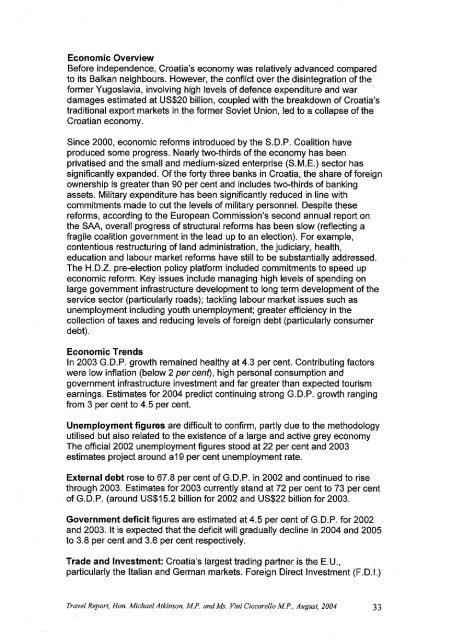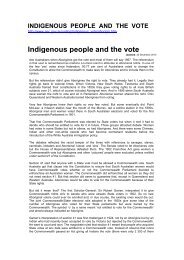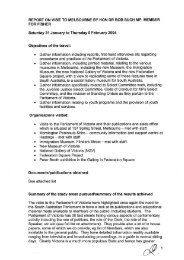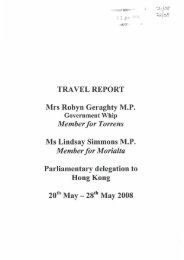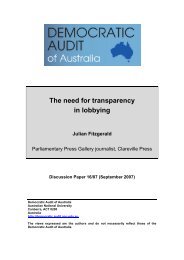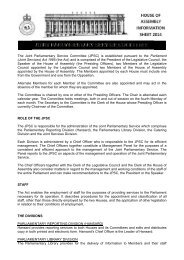TRAVEL REPORT The Hon. Michael Atkinson MP Attorney-General ...
TRAVEL REPORT The Hon. Michael Atkinson MP Attorney-General ...
TRAVEL REPORT The Hon. Michael Atkinson MP Attorney-General ...
You also want an ePaper? Increase the reach of your titles
YUMPU automatically turns print PDFs into web optimized ePapers that Google loves.
Economic OverviewBefore independence, Croatia's economy was relatively advanced comparedto its Balkan neighbours . However, the conflict over the disintegration of theformer Yugoslavia, involving high levels of defence expenditure and wardamages estimated at US$20 billion, coupled with the breakdown of Croatia'straditional export markets in the former Soviet Union, led to a collapse of theCroatian economy .Since 2000, economic reforms introduced by the S.D .P . Coalition haveproduced some progress . Nearly two-thirds of the economy has beenprivatised and the small and medium-sized enterprise (S.M.E .) sector hassignificantly expanded . Of the forty three banks in Croatia, the share of foreignownership is greater than 90 per cent and includes two-thirds of bankingassets . Military expenditure has been significantly reduced in line withcommitments made to cut the levels of military personnel . Despite thesereforms, according to the European Commission's second annual report onthe SAA, overall progress of structural reforms has been slow (reflecting afragile coalition government in the lead up to an election) . For example,contentious restructuring of land administration, the judiciary, health,education and labour market reforms have still to be substantially addressed .<strong>The</strong> H .D.Z . pre-election policy platform included commitments to speed upeconomic reform . Key issues include managing high levels of spending onlarge government infrastructure development to long term development of theservice sector (particularly roads) ; tackling labour market issues such asunemployment including youth unemployment ; greater efficiency in thecollection of taxes and reducing levels of foreign debt (particularly consumerdebt) .Economic TrendsIn 2003 G .D .P . growth remained healthy at 4 .3 per cent . Contributing factorswere low inflation (below 2 percent), high personal consumption andgovernment infrastructure investment and far greater than expected tourismearnings . Estimates for 2004 predict continuing strong G .D.P . growth rangingfrom 3 per cent to 4.5 per cent .Unemployment figures are difficult to confirm, partly due to the methodologyutilised but also related to the existence of a large and active grey economy<strong>The</strong> official 2002 unemployment figures stood at 22 per cent and 2003estimates project around al 9 per cent unemployment rate .External debt rose to 67 .8 per cent of G.D .P . in 2002 and continued to risethrough 2003 . Estimates for 2003 currently stand at 72 per cent to 73 per centof G.D.P . (around US$15 .2 billion for 2002 and US$22 billion for 2003 .Government deficit figures are estimated at 4.5 per cent of G .D.P . for 2002and 2003 . It is expected that the deficit will gradually decline in 2004 and 2005to 3 .8 per cent and 3 .6 per cent respectively .Trade and Investment : Croatia's largest trading partner is the E.U .,particularly the Italian and German markets . Foreign Direct Investment (F .D .I .)Travel Report, <strong>Hon</strong> . <strong>Michael</strong> <strong>Atkinson</strong>, M.P. and Ms . Vini Ciccarello <strong>MP</strong>., August, 2004 33


